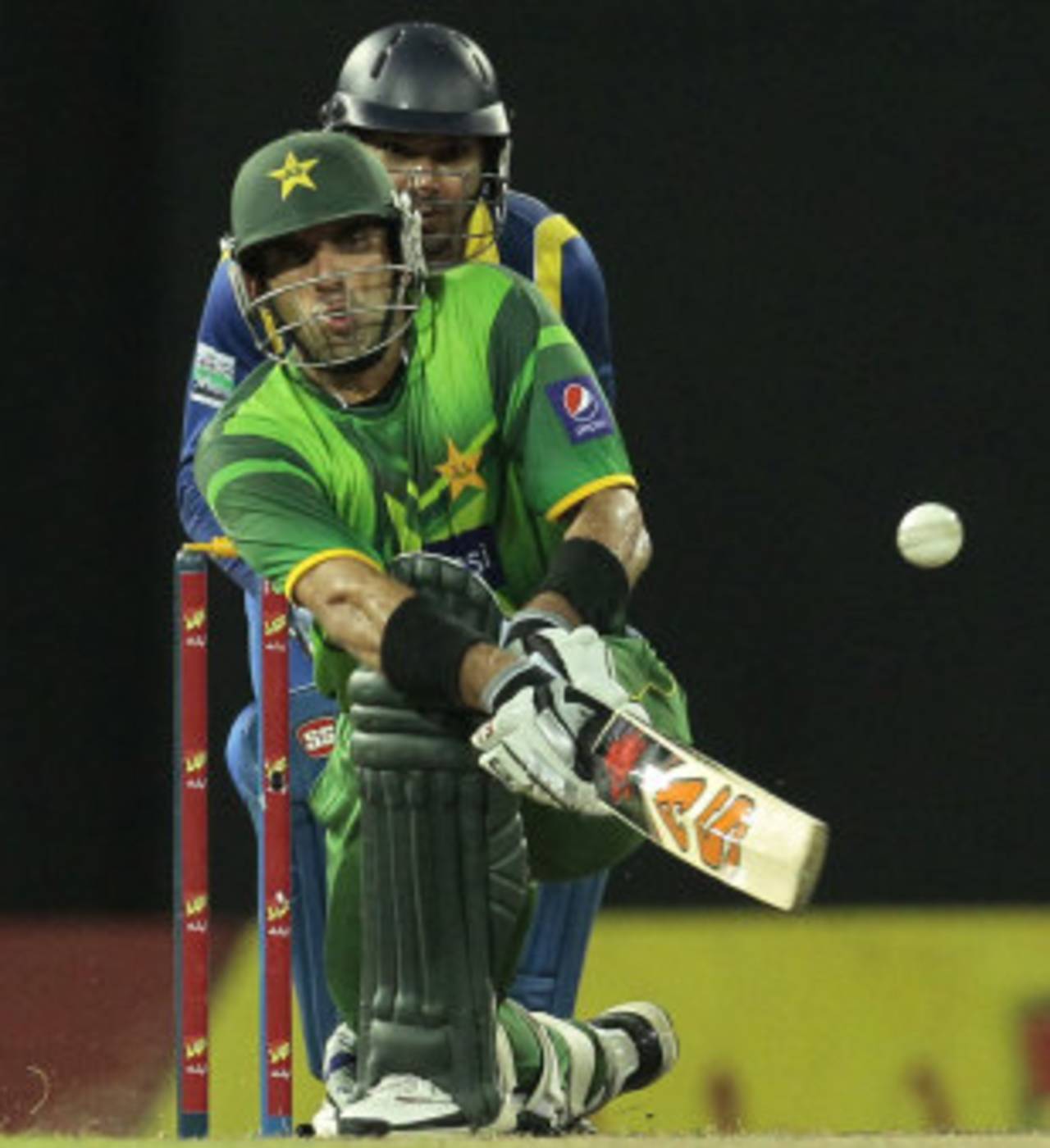Pakistan's batting issues resurface in ugly collapse
A dramatic slide handed Sri Lanka a match Pakistan had no business losing, and it's likely the visitors lost the game in the mind rather than on the pitch
Kanishkaa Balachandran in Colombo
17-Jun-2012

Misbah-ul-Haq: "It was a simple equation. We should have achieved it easily, without taking risks." • Associated Press
Misbah-ul-Haq couldn't offer any explanation as to why Pakistan combusted, converting what appeared to be a walkover into an embarrassing defeat. It must have been hard enough digesting the numbers - seven wickets fell for 13 runs inside four overs - and worse would have been the realisation that the collapse actually began with his wicket. Pakistan weren't supposed to lose this game. With 81 needed off 78, two set batsmen at the crease and eight more to come - including their most experienced at No.6 - it would have taken a lot to bet against them winning. The pressure created by one sharp catch in the infield followed by a bouncer barrage, though, resulted in Pakistan's crumble.
What is more glaring in Pakistan's defeat is the fact that they cannot hide behind the excuse of being a batsman short. A heavy defeat in the second ODI at Pallekele exposed an imbalance in their line-up, so they sought to rectify that by dropping a seamer and bringing in another batsman. With at least two batsmen struggling for form, including Misbah, it was imperative they played seven batsmen apart from the keeper.
Spare a thought for Azhar Ali. A half-century in a format he wasn't associated with at the start of his career invariably ends up in a losing cause, due to no apparent fault of his own. True, he may never find himself in the league of swashbuckling openers, but that wasn't the role intended for him in the first place, as his captain reiterated on this tour. As a grafter, he was meant to be the pivot around which others would bat. For the second time in three games, he was ditched by his more experienced colleagues. For the second time, a hard-fought fifty was drowned in defeat.
Misbah didn't extend any excuses. "Having played so many batsmen, each of them realise their responsibilities. We needed a run-a-ball and the batsmen should have taken more responsibility but they didn't," Misbah said. "We took it for granted that we had the match in our hands."
While together, Azhar and Misbah had adopted a conservative approach towards the target of 244, grafting the singles and dispatching the odd bad delivery to the boundary. The pair had added 99 - the bulk of it during the non-Powerplay overs - but as it happened, the period in which the field restrictions became mandatory also coincided with Pakistan's slide.
Predictably, the Sri Lanka captain Mahela Jayawardene had saved his best bowler, Lasith Malinga, for the batting Powerplay. Pakistan took six off his first over in that spell, but in the following over - the 37th - an incident hampered Azhar's chances of batting through. Turning back at the crease to avoid a run out, he pulled a calf muscle, and with no runners allowed, the pair had to look for boundaries.
Misbah tried exactly that but fell to a sharp catch at mid-off by Kulasekara. Malinga then softened Umar Akmal up with three consecutive bouncers, and the batsman appeared jolted by that barrage. Kulasekara cleverly pitched it up the following over and had Akmal chasing and edging to the keeper. Suffice to say though that Akmal botched yet another opportunity to guide his team home.
A wobbly Younis Khan, dropped to No.6 owing to his poor form, also fell edging in a freakish over from Thisara Perera that included a hat-trick and a run-out. Shahid Afridi fell to the poorest shot in that maniacal period, before the pressure got to Sarfraz Ahmed, who steered the hat-trick ball to slip. Sri Lanka were within touching distance of avenging two famous collapses in Sharjah, in 1999 and 2011.
It wouldn't be fair to blame the Pakistan captain for the collapse as there was enough competency in the batting to follow. Misbah admitted his players lost the game in the mind. "It was a simple equation. We should have achieved it easily, without taking risks," Misbah said. "In my view the batsmen need to have a compact technique in conditions in Sri Lanka, where the ball swings and seams a bit. We need to be mentally strong."
Misbah also defended demoting Younis to No.6, given his average of 44 in 28 innings in that position. "He was struggling at the top. My form too was poor so I promoted myself to No. 4. Asad Shafiq is playing well. Even in Sri Lankan conditions, you need experience even at the bottom. He [Younis] has played at No.6 before, so we pushed him down."
Not for the first time on tour, Misbah admitted that the fielding was a let-down. He refrained from singling out individuals, saying he hoped none of those mistakes will be repeated. Besides the collapse, the other sore point was that this was Pakistan's 15th defeat in 18 chases of 240-plus in the last three years.
Now 1-2 down in the series with a must-win final game on Monday, Pakistan would hope this collapse was just an aberration in their recent impressive head-to-head record against Sri Lanka. Public memory is short, and Pakistan would hope it remains that way.
Kanishkaa Balachandran is a senior sub-editor at ESPNcricinfo